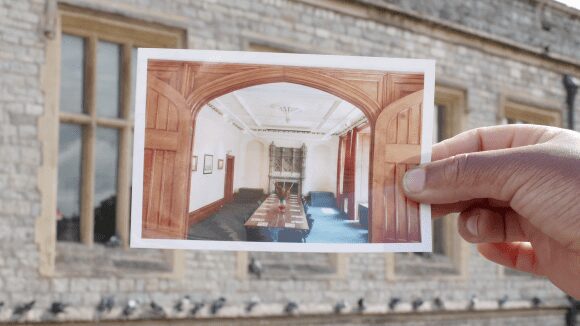KW Institute of Contemporary Art, Berlin, Germany
12 Dec 2020 - 30 Dec 2020

Onyeka Igwe, A So-Called Archive, 2020, video. Co-commission by KW Institute of Contemporary Art, Berlin; Plug-In ICA, Winnipeg; and Mercer Union, Toronto; with support from Julia Stoschek Collection and Outset Germany_Switzerland. Courtesy the artist
With a forensic lens, Onyeka Igwe’s A So-Called Archive interrogates the decomposing repositories of Empire. Blending footage shot over the past year in two separate colonial archive buildings—one in Lagos, Nigeria, and the other in Bristol, United Kingdom—this double portrait considers the ‘sonic shadows’ that colonial images continue to generate, despite the disintegration of their memory and their materials. Igwe’s film imagines what might have been ‘lost’ from these archives. It mixes the genres of the radio play, the corporate video tour, and detective noir, with a haunting and critical approach to the horror of discovery.
In Lagos, the former Nigerian Film Unit was one of the first self-directed outposts of the British visual propaganda engine, the Colonial Film Unit (1932–1955). A So-Called Archive documents a building largely emptied of its contents: desolate rooms now house dust, cobwebs, stopped clocks, and rusty and rotting celluloid film cans. The films found in this building are hard to see, not only because of their condition, but also perhaps because people do not want to see them. Meanwhile, in Bristol Temple Meads, the former British Empire and Commonwealth Museum (2002–2009) was previously housed in one Isambard Kingdom Brunel’s most famous railway designs. The museum included photography, film, sound and object collections gathered from locations across the former British Empire. Like the Nigerian Film Unit, this building too has been purged; the museum closed shortly after reported allegations of the illegal sale of several items from its collection.
A So-Called Archive depicts these former vaults—along with their histories of hoarding, monetisation, documentation and now abandonment—as metonyms for the enduring entanglements between the UK and its former colonies. These sites were and continue to be home to purulent images that we cannot, will not, or choose not to see.
Onyeka Igwe is an artist filmmaker, programmer, and researcher. She is currently based in London. In her non-fiction video work, Igwe uses dance, voice, archive, and text to expose a multiplicity of narratives. The work explores the physical body and geographical place as sites of cultural and political meaning. Igwe’s video works have been screened at the Institute of Contemporary Arts, London, 2017; Dhaka Art Summit, 2020; and at film festivals internationally including the London Film Festival, 2015; Rotterdam International (NL), 2018, 2019 and 2020; Edinburgh Artist Moving Image (GB), 2016; Images Festival, Toronto (CA), 2019; and the Smithsonian African American film festival, Washington, D.C., 2018. Solo projects include Corrections, with Aliya Pabani, Trinity Square Video, Toronto (CA), 2018; and There Were Two Brothers, Jerwood Arts London, 2019. Recent group projects include [POST] Colonial Bodies 2, CC Matienzo, Buenos Aires, 2019; there’s something in the conversation that is more interesting than the finality of (a title), The Showroom, London, 2018; World Cup!, articule, Montreal (CA), 2018; Arguments, Cordova, Vienna, 2017; and Multiplex, Nuit Blanche, Toronto (CA), 2016. In 2020, Igwe was awarded the Arts Foundation Futures Award for Experimental Short Film and was the recipient of the Berwick New Cinema Award in 2019.
Onyeka Igwe’s forthcoming film is a co-commission by KW Institute of Contemporary Art, Berlin; Plug-In ICA, Winnipeg; and Mercer Union, Toronto; with support from Julia Stoschek Collection and Outset Germany_Switzerland. Additional support from Tyneside Cinema Projections, Newcastle-Upon-Tyne.
Organised in collaboration with the Julia Stoschek Collection and OUTSET Germany_Switzerland, the KW Production Series is inspired by KW’s founding principles as a place of production, critical exchange, and thoughtful collaboration. This series seeks to identify and serve artists that are at a pivotal moment in their work and career—those who will benefit not only from the financial support and institutional visibility this opportunity provides, but also those who will be able to use the KW Production Series to significantly contribute towards the depth and rigor of their moving image practice.